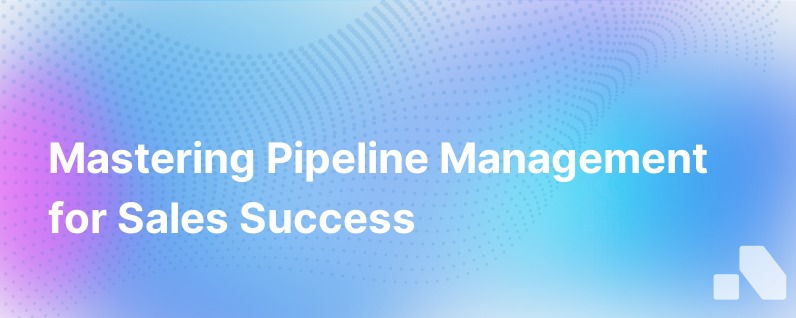
Effective pipeline management is a core competency for sales professionals, and ongoing training can dramatically improve a sales team’s performance. With the competitive landscape and customer expectations continuously evolving, systematically nurturing and progressing leads through the pipeline is more crucial than ever.
In this extensive article, we will break down the essentials of pipeline management, explore the principles and strategies integral to success, and how organizations can implement pipeline management training to maximize the efficacy of their sales teams. Here's everything you need to know about developing a pipeline management training program:
What Is Pipeline Management?
Pipeline management refers to the process of overseeing and directing future sales in various stages of the sales process. It involves tracking prospects, managing sales opportunities from the initial contact through the closing of the deal, and optimizing the flow of sales opportunities to increase conversion rates and achieve sales targets.
The primary goals of pipeline management are to help salespeople identify where prospects are in the sales cycle, understand what actions are necessary to move them through the pipeline, and ensure that the pipeline is always brimming with qualified leads.
Why Is Pipeline Management Training Crucial?
Training your sales teams in pipeline management is pivotal for several reasons:
- It ensures that everyone uses a consistent methodology, which is critical for accurate forecasting and effective communication within the team.
- Sales representatives become more adept at prioritizing deals and focusing their efforts where they can make the most significant impact.
- It helps in identifying bottlenecks and areas of the sales process that need improvement.
- Ongoing training can align sales efforts with changing market dynamics and equip teams with modern tools and techniques.
- It can lead to better resource allocation, as managers can more accurately predict revenue streams and adjust strategies accordingly.
The Core Elements of Pipeline Management Training
Understanding the Sales Pipeline
The training should begin with an overview of the sales pipeline stages: lead generation, lead qualification, needs assessment, proposal, negotiation, and close. It's imperative that sales reps understand the characteristics and requirements of each stage.
Lead Prioritization
Sales reps should be taught how to score leads based on their likelihood to convert and their potential value to the company. Training should include the use of CRM tools to help prioritize tasks and ensure follow-up actions don't fall through the cracks.
Pipeline Analysis
Sales professionals must know how to analyze their pipelines for weak spots—stages where prospects consistently drop off or get stuck. Training should include exercises in analyzing win rates, average deal size, and sales velocity.
Time Management
Effective time management techniques can help reps focus on the most promising leads and activities that align with their goals. Training should teach how to allocate time for prospecting, follow-up, research, and administrative tasks efficiently.
Sales Forecasting
Understanding how to forecast sales accurately is crucial for planning and resource allocation. Sales reps need to learn how to use historical data, combined with the current pipeline status, to predict future sales.
Technology Utilization
In this digital age, familiarity with CRM software and other sales tools is non-negotiable. Training needs to include not just initial instruction but ongoing sessions to keep skills current with the latest software updates and features. Continuous Improvement
The sales landscape is constantly in flux, so it is necessary to adopt a mindset of continuous learning and improvement. Training programs should encourage reps to routinely reflect on the sales process and their personal performance.
Implementing Pipeline Management Training
Curriculum Development
Start by developing a detailed curriculum that covers all facets of pipeline management. This should be a mix of theoretical knowledge, practical exercises, and real-life case studies.
Interactive Workshops
Conduct interactive workshops where sales reps can engage in role-playing scenarios to practice pipeline management strategies. Including group discussions can also provide valuable peer learning opportunities.
One-on-One Coaching
Personalized coaching sessions can help address individual gaps in skills or knowledge. These sessions can be tailored to the specific challenges that each sales rep faces.
Utilizing Metrics
Measure the knowledge and effectiveness of pipeline management both before and after training. Track metrics such as conversion rates, deal sizes, and sales cycle lengths.
Refresher Courses
Regularly scheduled refresher courses can help maintain high standards of performance and ensure that all team members are up-to-date on the latest techniques and tools.
Alignment with Business Goals
It's essential that pipeline management training is aligned with overall business goals. This ensures that sales efforts are contributing directly to the company's strategic objectives.
Examples and Best Practices
Sales reps need real-world applications of pipeline management principles. Provide case studies and share best practices that show how effective pipeline management has led to significant sales wins.
Motivation and Incentives
Motivation plays a big role in the successful adoption of pipeline management practices. Consider implementing incentive programs that reward sales reps for diligent pipeline management.
Conclusion
Effective pipeline management is more than just monitoring stages; it requires analytical thinking, strategic planning, and impeccable execution. Training your sales team in advanced pipeline management techniques ensures they have a solid foundation, and regular updates to their training ensure they keep up with evolving sales environments and technologies.
By committing to pipeline management training, your business is making a strategic investment in its success. You're not only equipping your sales team with the tools and knowledge they need to thrive but fostering a culture of excellence and continuous improvement critical for long-term growth.
For sales organizations looking to streamline their processes and adopt cutting-edge technologies, integrating a smart platform like Aomni can help supercharge their pipeline management training. Aomni's AI-driven tools empower sales teams to implement best practices in real-time, leverage actionable insights, and stay ahead in a competitive market.